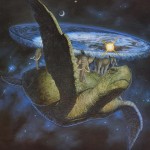What makes the Discworld series so popular? This was what I set out to answer in my bachelor’s thesis which I wrote last year about Sir Terry Pratchett’s series of novels. In the thesis I argued that one of the key components behind the popularity of the books among critics and readers alike is their extensive reference base, that is, the clever use of allusions and the subversions of literary tropes most audiences are familiar with.
In the thesis I focused solely on the City Watch sub-series of the Discworld books, but even then felt that the topic merited more research, since the City Watch novels only make up a fraction of the entire series – eight books of out a total forty. Thus I decided to attempt something similar this semester, now concentrating on a single novel: Witches Abroad.
Lawrence Watt-Evans writes the following about the series in his book The Turtle Moves!: “the entire series is about stories. I don’t mean it is stories; obviously, every fiction series is made up of stories. No, the Discworld stories are all about stories, as well as being stories themselves.”

As Watt-Evans also notes, this is most evident in Witches Abroad, where the main antagonist of the book uses and manipulates classic fairy tale conventions to achieve her goals: through Lilith’s machinations the reader encounters versions of familiar tales such as “Cinderella” or “The Frog Prince,” and witnesses them being twisted in unfamiliar ways.
In my research paper I attempted to demonstrate elements of Witches Abroad that allude to, use, or subvert traditions usually associated with fairy and folk tales in the same manner as I had contrasted the City Watch novels with chivalric romance conventions in my bachelor’s thesis last year, hoping to illustrate once again an important feature of Pratchett’s literary genius.
As someone who gets excited – perhaps even unreasonably so – about media referencing other media, I greatly enjoyed rereading Witches Abroad and trying to look for references to fairy tales. Consulting the companion book The Folklore of Discworld was also both helpful and exceptionally entertaining, as was being able to get lost on my favourite wiki, TV Tropes, in the name of (literary) scholarship, and I hope to be able to conduct further research into even more Discworld novels in the future.


